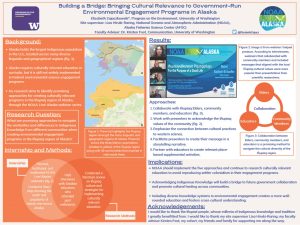Building a Bridge: Bringing Cultural Relevance to Government-Run Environmental Engagement Programs in Alaska
Creating culturally relevant environmental education can promote healing of intergenerational trauma posed by the settler state and motivate students to pursue fields they have traditionally been excluded from. The aim of this study was to find promising approaches to improve the cultural relevance of National Oceanic and Atmospheric Administration’s (NOAA) environmental engagement programs in the Iñupaiq region of Alaska. As an outreach and education intern with NOAA’s Alaska Fisheries Science Center (AFSC), I worked with NOAA Live! Alaska, which is a series of interactive webinars aimed at Alaskan students in grades 2-8 to highlight the work researchers are doing in their community. As a part of my internship, I helped moderate and plan these live webinars by meeting with speakers and organizing questions. I held interviews with Alaskan educators, analyzed past webinar analytics, and reviewed current literature to answer my researchable question. Through these methods, I found that collaborating with community members, teachers, and Elders; the inclusion of the Iñupiaq cultural values of the community; the addition of relevant place-based supplemental activities; and a clear connection of cultural practices to STEM are essential steps to make webinar content relevant. Indigenous Alaskan people continue to face the oppressive force of settler colonialism brought on the federal government. Acknowledging Indigenous Knowledge will make steps toward improving this relationship and building a bridge to future collaboration and cultural healing across communities. Including diverse knowledge systems in environmental engagement creates a more holistic and well-rounded education experience for everyone involved.
